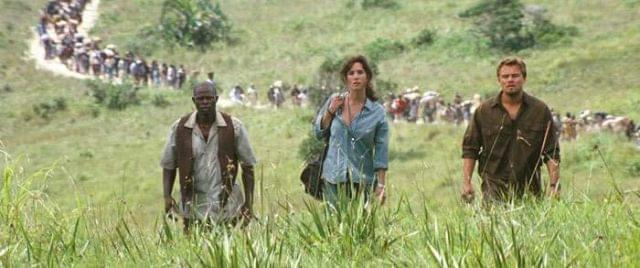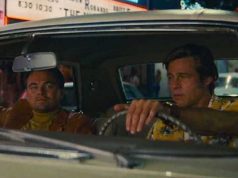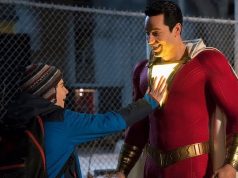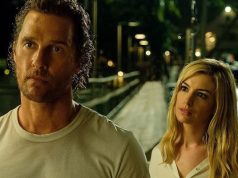
This week’s lesson in good citizenship comes from “Blood Diamond,” the unsubtle film (with the unsubtle title) that is meant to make us think twice about buying diamonds. As one of the characters puts it, “People back home wouldn’t buy a ring if they knew it cost someone a hand.” But come on, what if the ring is really pretty and costs the requisite three months’ salary? What’s a girl to do?!
“An Inconvenient Truth” told us not to use so much gasoline, “Fast Food Nation” tried to guilt us into banishing hamburgers, and now diamonds are off the table, too. 2006 has indeed been a banner year for killjoy movies.
There is artistic merit in “Blood Diamond,” though, at least to some extent. Directed by Important Issues filmmaker Edward Zwick (“Glory,” “Courage Under Fire,” “The Last Samurai”), it spotlights the brutality of the “conflict diamond” trade without seeming gratuitous or exploitative, and provides some fairly compelling personal stories to give it dramatic weight (something “Fast Food Nation,” a similar agenda-oriented film, lacked).
It’s set in 1999, with the African nation of Sierra Leone in a state of civil war over its vastly lucrative diamond mines. A radical anti-government group called the Revolutionary United Front (RUF) routinely invades villages to acquire new laborers for its diamond mining operations, an invaluable financial resource for its war efforts. They’ll force able-bodied men to work for them, brainwash children into becoming gun-toting terrorists, and kill or maim everybody else.
Since legitimate diamond companies won’t trade in gems with such a blood-soaked history, the RUF illegally transports them across the border into Liberia. (I won’t tell you how they’re smuggled, but the first thing you’ll need is a goat.) That way, the multi-billion-dollar corporations that sell diamonds to the public can do so with a clean conscience: “These diamonds didn’t come from Sierra Leone. They came from Liberia!” Plausible deniability helps everyone sleep better at night.
(All of this is as of 1999, by the way. Some things have changed since then, though conflict diamonds still account for 1 or 2 percent of the worldwide diamond trade.)
That’s the background, all of which is conveyed effectively in Charles Leavitt’s concise screenplay. The story involves Solomon Vandy (Djimon Hounsou), a Sierra Leone man who is forced into the mining camp by the RUF while his wife and daughters flee and his son, Dia (Kagiso Kuypers), is recruited for training. He escapes from the camp during a government attack, but not before hiding a massive diamond whose finding he neglected to report to his taskmasters.
He and his valuable hidden stone come to the attention of Danny Archer (Leonardo DiCaprio), a Rhodesia-born smuggler and mercenary who longs to get off this continent for good, and Maddy Bowen (Jennifer Connelly), a do-gooder American journalist who wants to open the world’s eyes to the travesty of the blood diamonds. Solomon wants to find his family and retrieve the diamond to keep it out of evil hands; Danny wants to sell the diamond for serious cash; and Maddy wants to use it as bait to catch one of the hypocritical diamond companies in the act of buying a gem they know is tainted. One stone, three purposes.
The movie finds drama in the conflicting personalities of Solomon and Danny. Solomon is an honest, decent man who can barely find the wherewithal to lie even when his life depends on it, while Danny will say or do anything if it furthers his goals. There’s a nice arc for Danny as he gains some measure of redemption over the course of the film, and DiCaprio acquits himself well enough, even handling the white-African accent better than the film’s advertisements would lead you to believe.
Hounsou, best known for “Amistad” and “In America” (for which he was Oscar-nominated), brings his characteristic intensity to the role of Solomon. Hounsou tends to play men with dignity and gravitas, wounded by the stings of fate but stoic in the face of adversity. “Blood Diamond” has him cry out in anguish a few too many times, I think — one such jarring outburst goes a long way — but it’s an earnest, solid performance.
The relationship between Danny and Maddy is underdeveloped and unnecessary, the fine acting of Jennifer Connelly notwithstanding. Her character plays a vital role in the film’s story, though, highlighting the futility of media exposure when it comes to crises like these. You can wring your hands over the plight of these poor villagers, and maybe you’ll even send a check to some humanitarian organization. But what good will it really do?
That bleak fact renders the film something of a wash. Our eyes are opened to the problem, but what are we supposed to do about it? The only way to be absolutely certain that your diamond didn’t come at the cost of someone’s life is to stop buying diamonds altogether — yet that would have a catastrophic impact on a lot of legitimate (and fragile) world economies. Not all lessons in good citizenship are pleasant, I guess.
B- (2 hrs., 18 min.; )





